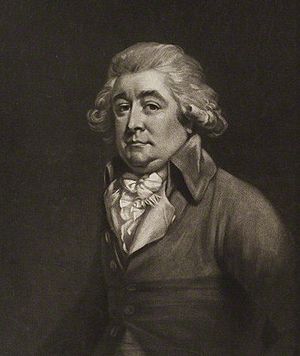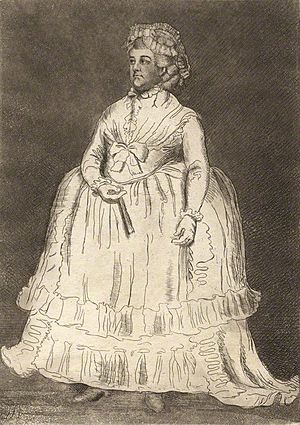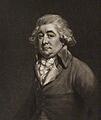Charles Bannister facts for kids
Charles Bannister (1738–1804) was a well-known English actor, comedian, and singer. He was famous for his amazing voice and funny performances on stage.
Contents
Early Life and First Steps in Acting
Charles Bannister was born in Gloucestershire, England. When he was seven, his family moved to Deptford. Charles was a strong and clever young man. He loved watching acting groups that visited his area. He dreamed of becoming an actor himself.
At 18, he started acting in plays like Romeo and Juliet and Richard III in Deptford. He tried to join the Drury Lane theatre, but they turned him down. However, he found success working in towns like Norwich and Ipswich.
In 1762, Samuel Foote gave him his first chance to act in London. This was at the Haymarket Theatre. Charles played Will Tirehack in a play called The Orators. Another actor, John Palmer, also made his debut that day. Charles and John became lifelong friends. Charles was known for his strong loyalty to his friends.
A Special Voice for Opera
People quickly noticed Charles's skills in comedy and mimicking others. But it was his singing voice that truly made him famous later on. Charles didn't have singing lessons. However, he had a natural voice that was very special. He could sing both very deep bass notes and very high falsetto notes perfectly. He also had an excellent ear for music. This allowed him to sing many types of songs. He could even imitate other singers with great humor.
A musician named William Parke said that Charles Bannister always sang in time and in tune. Yet, he didn't know how to read music notes! His songs were taught to him by a friend named Mr. Griffith Jones, who was a pianist at the Covent Garden Theatre.
Famous Roles in Operas
Charles Bannister became very popular as a singer. He performed at Ranelagh Gardens. He was especially known for his roles in the early operas by Charles Dibdin.
- In 1768, he appeared in Damon and Phillida and The Padlock.
- In 1774, he was the first actor to play Tom Tug in Dibdin's famous opera, The Waterman. This play first opened at the Haymarket.
- He also appeared in the first show of The Cobbler.
- In 1777, he was the first Mr. Steady in The Quaker at Drury Lane. Many people said no one played Mr. Steady as well as he did.
- In 1779, he was in the first performance of The Chelsea Pensioner.
- In 1789, he played the Sergeant in The Recruiting Serjeant. This was a musical show by Dibdin and Isaac Bickerstaffe at the Royalty Theatre.
Later, other singers like Charles Incledon and Charles Dignum took over his roles. They were his friends and sang these parts with a tenor voice, which is higher than Charles's bass or baritone voice.
In 1776, Charles Bannister sang in the opera Zelima and Azore. He used his "fine rich and mellow bass voice." This opera was composed by Thomas Linley.
Roles in Shield's Operas
Charles Bannister also starred in many new operas by his friend William Shield.
- In 1778, he was Captain Wilson in Shield's The Flitch of Bacon.
- In 1782–83, he was the first Mr. Belville in Shield's Rosina. His song "Her mouth, when a smile" became one of his signature songs.
- In 1783, he played Captain Fitzroy in Shield's The Poor Soldier.
- In 1784, he sang "As burns the charger" in Robin Hood. He also sang a popular duet with 'Jack' Johnstone called "How sweet in the woodlands."
- He also performed in the first shows of Shield's The Farmer (1787), The Highland Reel (1788), The Crusade (1790), The Czar (1790), and The Woodman (1791).
Charles Bannister was known for making many songs famous. People said no one sang them better than him. Some of these songs included "Brave Admiral Benbow" and "Stand to your guns, my Hearts of Oak!" When he sang "Reserve your fire" in that last song, his voice would get very quiet. Then, he would burst out with a powerful "Fire!" This had an amazing effect on the audience.
Playing Female Roles
Charles Bannister was said to have "one of the most extensive falsettos ever heard." A falsetto is a very high singing voice, often used by male singers to sound like a female voice.
The famous actor David Garrick once took a composer to hear Charles imitate other singers. The composer said Charles's imitations were perfect. He even said Charles was better than the original singers!
In 1781, Charles appeared as Polly in a funny version of The Beggar's Opera. This was at the Little Theatre in the Haymarket. He sang Polly's gentle songs with his deep, powerful bass voice. He didn't try to sound like a woman or act silly. Instead, the humor came from his deep voice and strong build singing a female part. He was very good at it. A visiting Italian male singer was very confused and didn't realize it was a comedy show.
Great Roles in Drama
Charles Bannister was so popular that David Garrick hired him for Drury Lane.
He played an "admirable" Hecate in a production of Macbeth in 1794. This was at the opening of the new Drury Lane Theatre. He acted alongside famous actors like John Kemble and Mrs Siddons.
The Tempest gave Charles Bannister another famous role: Caliban. He had a deep, strong voice for both speaking and singing. He also had a large and powerful stage presence. This made him an amazing Caliban. Many people said that no one after him could play the monster as perfectly as Charles Bannister did.
His Character and Wit
Charles Bannister was famous for his quick wit and humor. He was very good at making clever remarks. But he never used his wit to be mean or hurtful. Because of this, his jokes were always well-received.
He was very popular with the public. His English style of singing and acting made a strong impression. He was also well-liked in social groups. People wanted him at their gatherings because he was always in a good mood and had many talents. His kindness, honesty, and integrity earned him the nickname "Honest Charles Bannister." However, he wasn't very good at managing his money.
Here are a few examples of his famous wit:
- David Garrick's brother, George Garrick, always asked, "Has my brother wanted me?" when he came to the theatre. George died soon after David's funeral. When someone said this was unusual, Charles Bannister replied, "Not at all. His brother wanted him."
- Another time, a criminal asked the hangman, Jack Ketch, if he had any messages for the other world. Jack Ketch, as he tied the rope, said, "Why, not much – I'll – only – just – trouble you – WITH A LINE."
The stories from that time are full of Charles Bannister's clever jokes. He seemed to always have a funny remark ready.
It is said that Charles Bannister's wit even earned him free food and a place to stay for life! This was at the One Tun Tavern on Jermyn Street. The tavern became popular because Charles often visited and attracted many customers with his humor. The owner offered him free room and board as long as he stayed. Charles accepted, and the agreement lasted until his death.
In 1793, Charles Bannister, William Shield, Charles Incledon, Charles Dignum, 'Jack' Johnstone, Charles Ashley, and William Parke formed a group called 'The Glee Club'. They met every two weeks for singing and dinner.
Charles Bannister passed away on October 26, 1804. He had been ill for some time and could no longer perform. In his last weeks, many benefit performances were held for him. The managers of the main theatres allowed their leading actors to perform for free to help him. His son, John Bannister, also became a very famous actor and theatre manager.
Images for kids
 | Aurelia Browder |
 | Nannie Helen Burroughs |
 | Michelle Alexander |





